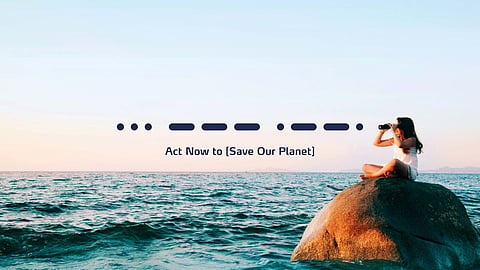Act Now to Save Our Planet
Last year, Yara Marine launched the distress signal Save Our Planet – represented by the morse code SOP – to highlight our concerns about the climate crisis and urge the maritime industry to move rapidly on decarbonization.
Thomas Koniordos, CEO of Yara Marine Technologies said: "Now, as we leave behind us yet another summer marked by unprecedented climate emergencies around the globe, we are again calling upon the whole industry to take decisive actions to accelerate the green transition.
"The number of stakeholders sharing our concerns is ever-increasing, and institutional support is strongly spreading.
"The International Maritime Organization made its clear stance on greening operations earlier this year by announcing the 2022 World Maritime Theme of 'New Technologies for Greener Shipping – and No One Left Behind'.”
There are Customers Today Willing to Pay for Green Shipping: Lars Jensen
This theme recognizes that the green transition must be inclusive in order to succeed. That is a vital point. If the transition does not encompass the entire global fleet and all its stakeholders, we cannot hope to reach Net Zero emissions.
DNV is also putting the issue at the forefront of its agenda. In their latest “Maritime Forecast to 2050” report, they note that industry stakeholders who choose to delay the implementation of decarbonization measures will face increasing risk due to mounting regulatory and commercial pressure.
According to their “Pathway to Net Zero Emissions” report, decarbonization of shipping will demand a combination of higher energy efficiency, improved logistics, and new fuels, which in turn will require intensified uptake of both technical and operational measures.
The perspectives put forward by the IMO and DNV point us toward two important acknowledgments:
"First, we must acknowledge that any roadmap for the green transition has to account for the needs of many different stakeholders, vessels, and operations – needs that are certain to evolve as the transition moves along."
"This will therefore have to include a variety of technical and operational innovations. There will be no single silver bullet to address our shared challenge," he said.
"Second, we must acknowledge that Net Zero should be viewed as a process rather than a final destination. The goal posts will continually shift to allow for greater improvements and smaller environmental impacts."
This is already evident from incoming regulatory requirements such as EEXI (Energy Efficiency Existing Ship Index) and CII (Carbon Intensity Indicator), which lay the foundation for continuous improvement of the global fleet.
Koniordos said: "When taking these acknowledgments into consideration, it becomes clear that the time to act is now. Rather than waiting for a watershed moment that will not come, the maritime industry should take measures today that allow for steady progression towards Net Zero tomorrow.
"However, it is one thing to recognize the urgent need for change and quite another to follow through with concrete actions – after all, we are facing a complex challenge that brings with it numerous uncertainties.
"It is entirely understandable that many stakeholders are still preoccupied with discussions about which technology or fuel will “win out”, and that many are worried about investing in solutions that may become obsolete."
The good news is that there are many solutions available in the market today that have proven themselves both environmentally and economically, and that will continue to do so long into the future.
Across the industry, technology development has resulted in substantial advances within vessel design, fuel economy, emissions abatement, alternative propulsion methods, performance management, and artificial intelligence.
If we seize these opportunities, we can achieve drastic reductions in both emissions and costs – from this very moment on. That is how we get the transition on track and begin saving our planet.
"At Yara Marine Technologies, we are committed to helping our industry into the future. We stand ready to do our part by developing, implementing, and scaling up clean technologies that benefit the maritime industry on its decarbonization journey."
"This journey does not need to be sacrificial – quite to the contrary. With foresight and collaboration, we will emerge with renewed strength. We ask you to join us in this pursuit by endorsing the distress signal SOP and sharing the hashtags #ActNow #SaveOurPlanet."
"Together, we can be the change our industry needs and ensure a healthy planet for future generations."
Read More: MPA, Port of Rotterdam to Establish Green Corridor for Clean Shipping


